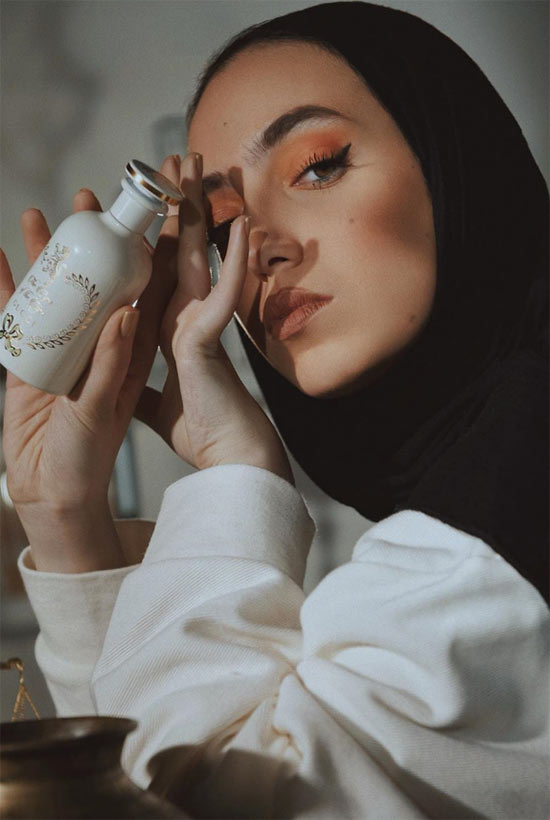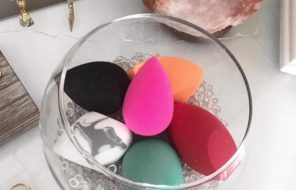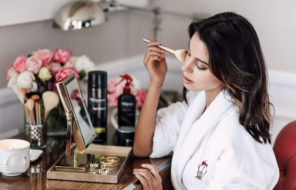- Perfume or fragrance oils are the alcohol-free, all-natural types of perfume based on raw fragrant plant-derived ingredients.
- They are longer-lasting with 6-15 hours of wear on average, more affordable, and gentler to the skin.
- You apply perfume oils directly onto the skin, on the pulse points, and you can layer to create your signature scent.
Fragrance oils will undoubtedly charm you with every developing note and make you fall in love with this conveniently magical beauty trend. Here’s where to begin when looking for that perfect perfume oil to add to your fragrance collection.
In this article:
- What Is Fragrance Oil?
- Reasons Why to Choose a Perfume Oil
- Perfume Oil vs. Perfume vs. Body Spray
- How to Use Perfume Oils Correctly?
What Is Fragrance Oil?
Also known as perfume oil or aroma oil, fragrance oil is a blend of synthetic or natural scents that are typically diluted with a carrier oil (vegetable or mineral oil). The main difference between a fragrance oil and a standard spray perfume is that perfumes have high alcohol content, which further dilutes the scent.
The oils that are used for the production of perfume oils are extracted from raw materials. Since there is no alcohol, they tend to linger longer on the skin and develop its notes in a different manner to alcohol-based fragrances.
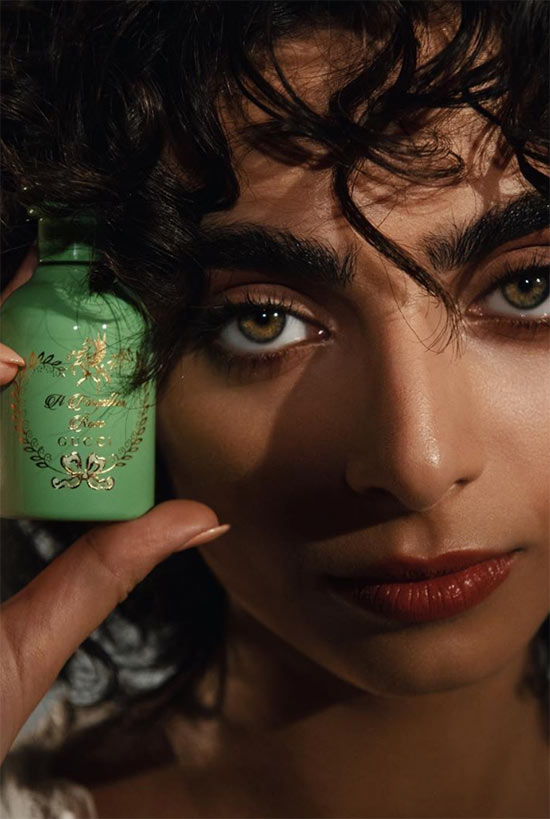
There are four main categories of scent families, each consisting of multiple subtypes:
- Oriental
- Rich, exotic aromas
- Commonly described as seductive
- Sweet and earthy notes
- Common notes: Myrrh, Vanilla, Anise
- Woody
- Warm, incense-like scents
- Can be described as bitter
- Aromatic, smoky notes
- Common notes: Patchouli, Sandalwood, Vetiver
- Fresh
- Clean, citrusy scents
- Typically described as fresh and clean
- Zesty, aquatic notes
- Common notes: Grapefruit, Sage, Bergamot
- Floral
- Most commonly used in perfumes
- Have a powdery note
- Can be slightly spicy
- Common notes: Rose, Jasmine, Orange blossom
The reason why it’s important to understand scent families is that each has specific qualities. People tend to be drawn to one over another when picking their own fragrance oil. If you know which scent family you prefer and the components of that specific family, it is easier to find the best perfume oil that really suits you.
Reasons Why to Choose a Perfume Oil
Even though roll-on perfume oils have long lived in the shadow of spray perfumes with an alcohol base, the trend seems to be slowly reversing. Here’s why you should choose a perfume oil over a regular perfume:
Long-Lasting
The best perfume oils will be superbly concentrated and made to stick to your skin. This means that, unlike spray-on perfumes and eau de toilettes, the fragrance will continue to build and develop on your skin during the day, and you won’t have to reapply it.
Great for Sensitive Skin
We’re confident we don’t have to explain the harmful effects alcohol can have on our delicate skin. Most spray perfumes will not be a good choice for those with dry, irritated, or sensitive skin, as the ingredients will only continue to worsen the already present issues. However, perfume oils are a fantastic alternative for any skin type, as they are typically moisturizing and nourishing.
Get More for Less
Let’s face it, high-quality perfumes can be incredibly expensive. Oil fragrances are usually much more realistically priced, allowing you to either save money or buy more. Not only are they conveniently packaged into small rollerball bottles, but they also offer control over how much product you want to apply. No more spraying the air and walking through it, leaving most of the perfume on the floor and the nearby furniture.
Higher Concentration but Not Overpowering
It might sound counterintuitive, but it’s true. Perfume oils are indeed made to have higher concentrations, but they will never leave you with a coughing fit. This is because fragrance oils stick to your skin and develop with the warmth of your body, unlike alcohol-based fragrances that tend to disperse widely, as they don’t cling to the skin so well.
Perfume Oil vs. Perfume vs. Body Spray
There are several differences you should be aware of when discussing the three fragrance products.
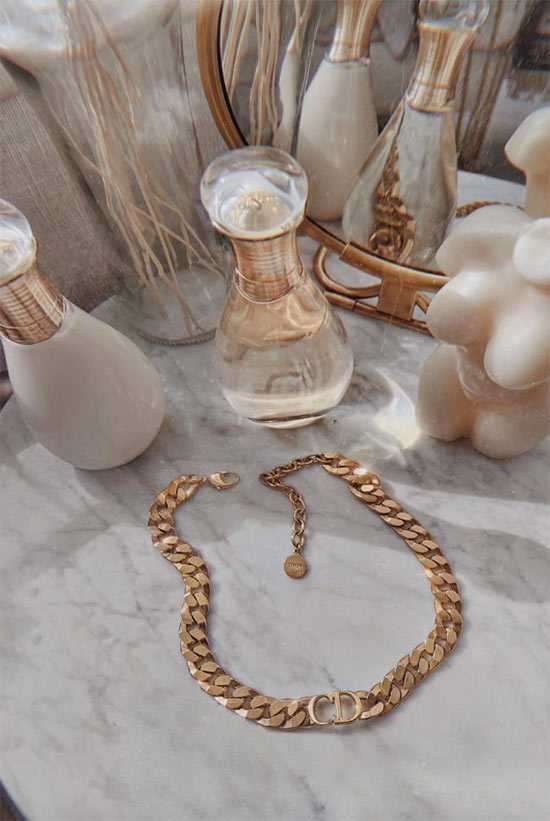
Product Base
The first and most obvious difference between these products is the base with which they are made. Perfume oils do not contain alcohol at all. They use carrier oils to develop aromas.
As a rule, perfumes and body sprays (that are not perfumed oil body sprays) have a high percentage of alcohol, which ultimately affects how your skin receives the fragrance and how you and others around perceive the scent.
Concentrations
Concentrations of aromas are important to distinguish in this context. Even though all three products may have the same fragrance formula, the perfume oil will likely have the highest concentration. Regular scented body sprays will have the lowest concentration and will remain detectable for the shortest amount of time.
Effects on the Skin
If you have dry, sensitive, or reactive skin, there is a high likelihood that your skin won’t love an alcohol-loaded product. Not only may your skin react poorly to a perfume or a body spray, but the fragrance you want to get from it won’t go that far, especially with dry skin.
The reason behind this is the fact that dry skin isn’t able to hold onto the scent, as there isn’t enough moisture to do so. When you add alcohol in the mix, the result is even more dehydrated skin. Oil-based perfumes are much better in this respect, as they simultaneously nourish the skin and allow proper adherence of the fragrance.
How the Scent Develops
There are major differences in how the scent develops when we compare a perfume spray, fragrance oil, and a body spray.
The best oil perfumes will develop very quickly and reveal the core notes. Those lighter and fresher notes will give way to reveal a more constant scent that lingers and deepens in synch with your body temperature. This is why it’s recommended to put perfume oil on pulse spots when the temperature is higher.
When it comes to perfumes and body sprays, the situation is significantly different. As the alcohol evaporates, each aroma category will reveal itself gradually until you’re left with the base notes alone.
In the first case, you get to enjoy all of the subtleties of the fragrances for a long time, which tend to grow and wane the way your body temperature dictates. In the case of body sprays and perfumes, you will experience distinct fragrances at different times, but only the core aromas will linger.
How to Use Perfume Oils Correctly?
Yes, there is a correct and incorrect way of using perfume oils. Here’s what to do to get the most out of your fragrance oil:
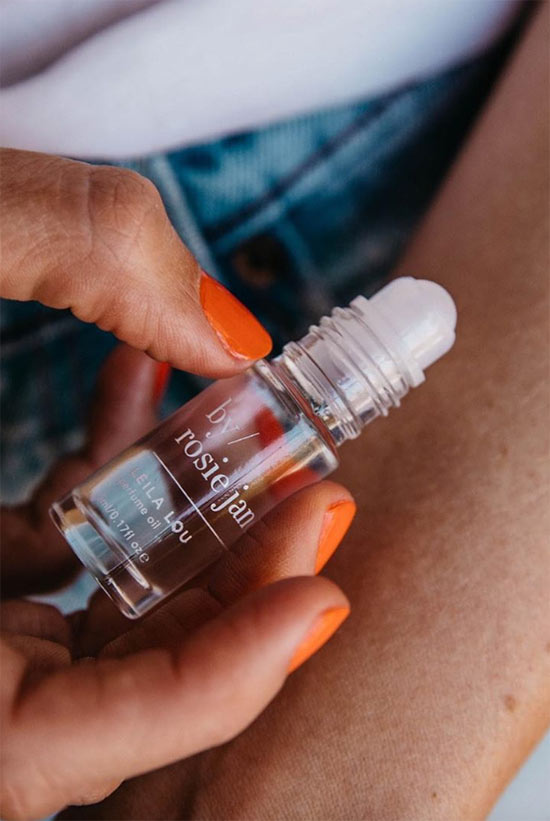
Timing
When using perfume oils, you want to give them time to develop on your skin. If you have an important date you want to smell divine for, make sure you put on your best fragrance oil at least 30 minutes earlier. This will be enough to allow the oils from the perfume to mix with the oils in your skin and create the scent you’re after.
Skin, Not Clothes
Apply fragrance oils to your skin and not to your clothes. Oils do not mesh well with fabrics and will leave a stain if you’re not careful. Also, make sure to wait a bit before you put on the outfit for the day to help the oil penetrate the skin and to be less likely to cause issues with stains.
Pulse Points
Choose your pulse points to take advantage of the warmth to develop the scent. Fragrance oils will reach their most potent phase when the body temperature is at its highest in those spots. Great spots to apply your perfume oil on are behind the ears, behind your knees, or in the crevice of your elbows.
Layering
Even though they are typically more concentrated than perfumes that have alcohol, you’ll find that the perfume oils are not as intense as you might think. So, if you’re looking for a stronger scent that will get you noticed, layer similar fragrances under or over your perfume oil (body lotions, body mists, washes, etc.).
Photos via @leenalghouti, Instagram

